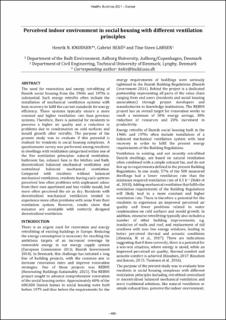Perceived indoor environment in social housing with different ventilation principles
Chapter, Peer reviewed, Conference object
Published version
Permanent lenke
https://hdl.handle.net/11250/2976108Utgivelsesdato
2021Metadata
Vis full innførselSamlinger
- SINTEF Proceedings [402]
Sammendrag
The need for renovation and energy retrofitting of Danish social housing from the 1960s and 1970s is substantial. Such energy retrofits often include the installation of mechanical ventilation systems with heat recovery to fulfil the current standards for energy efficiency. These systems typically ensure a more constant and higher ventilation rate than previous systems. Therefore, there is potential for residents to perceive a higher air quality and a reduction in problems due to condensation on cold surfaces and mould growth after retrofits. The purpose of the present study was to evaluate if this potential is realised for residents in social housing complexes. A questionnaire survey was performed among residents in dwellings with ventilation categorised within one of the five ventilation principles: natural ventilation, bathroom fan, exhaust fans in the kitchen and bath, decentralized balanced mechanical ventilation and centralized balanced mechanical ventilation. Compared with residents without balanced mechanical ventilation, residents having such systems perceived less often problems with unpleasant odour from their own apartment and less visible mould, but more often perceived the air as dry. Residents with decentralized mechanical ventilation tended to experience more often problems with noise from their ventilation system. However, results show that nuisance are avoidable with correctly designed decentralized ventilation.

